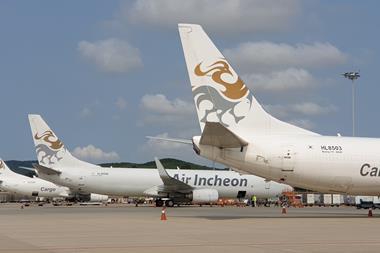Qantas Freight, the cargo arm of the Australian flag carrier, reported a 44% fall in full year earnings before interest and tax to A$64m, reflecting “difficult global cargo markets and the end of favourable legacy agreements with Australian Air Express”.
Commenting on the airline’s full year results ended June 30, group chief executive, Alan Joyce, said that the freight business is “well-positioned for the future”.
He added: “New long-term deals with Australia Post and Toll, the country’s two biggest freight customers, are in place in the domestic market. Qantas Freight is also pursuing new opportunities internationally, in particular on triangular Australia-China-US routes.”
Qantas Freight markets the freight capacity on Qantas and its Jetstar subsidiary passenger aircraft.
It also operates a fleet of 11 dedicated freighters which supplement capacity on key domestic and international routes: four Boeing 737-300CFs, four BaE146s, two SAAB 340s, two Boeing747-400Fs, one Boeing 767-300F and one B737-400F.
In June this year, Qantas Freight introduced a weekly freighter call to the southern US Dallas Fort Worth gateway as part of its triangular route connecting Australia, China, the US and Australia.
In May, Qantas and Australia Post inked a new dedicated domestic air-freighter network to be used exclusively by Australia Post and StarTrack customers
The dedicated network consists of six Qantas freighter aircraft featuring StarTrack livery, with continued priority access to cargo space in the Qantas group’s passenger fleet.
The network is part of the five year contract, with a value in excess of A$500m, signed last year for domestic mail, parcels and Express Post until mid-2020.










